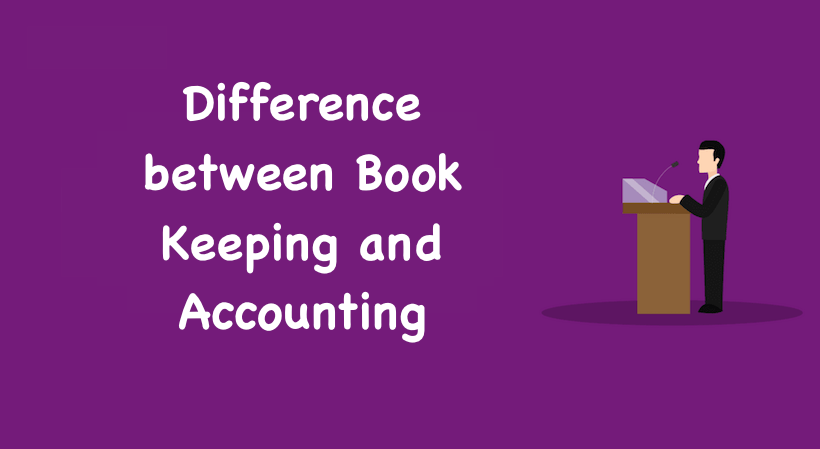Difference between Book Keeping and Accounting with Meaning: Book-keeping is an activity concerned with the recording of financial data relating to business operations in a significant and orderly manner. It covers procedural aspects of accounting work and embraces the record-keeping function. Obviously, book-keeping procedures are governed by the end product, the financial statements. The term ‘financial statements’ means Profit and Loss Account and Balance Sheet including Schedules and Notes forming part of Accounts.
Book keeping:
Book-keeping is mainly concerned with the recording of financial data relating to the business operations in a significant and orderly manner. It is concerned with the permanent record of all transactions in a systematic manner to show its financial effect on the business. It covers procedural aspects of accounting work and includes record-keeping functions.
It is the science and art of correctly recording in books of account all those business transactions that result in the transfer of money or money’s worth. It is mechanical and repetitive. This work of bookkeeping is of clerical nature and usually entrusted to junior employees of the accounts section of a business house. Now-a-days, most of the book-keeping work is done through computers and other electronic devices. In fact, accounting is based on a systematic and efficient book-keeping system.
The main purpose behind book-keeping is to show the correct position regarding each head of income and expenditure as well as assets and liabilities. Further, book-keeping is meant to show the effect of all the transactions made during the accounting period on the financial position of the business.
Book-Keeping and Accounting
Advertisement
Book-keeping and accounting are often used interchangeably but they are different from each other. Accounting is a broader and more analytical subject. It includes the design of accounting systems which the book-keepers use, preparation of financial statements, audits, cost studies, income-tax work, and analysis and interpretation of accounting information for internal and external end-users as an aid to making business decisions. This work requires more skill, experience, and imagination. The larger the firm, the greater is the responsibility of the accountant. It can be said that accounting begins where book-keeping ends. Book-keeping provides the basis for accounting.
Some people mistake book-keeping and accounting to be synonymous terms, but in fact they are different from each other. Accounting is a broad subject. It calls for a greater understanding of records obtained from book-keeping and an ability to analyse and interpret the information provided by book-keeping records. Book-keeping is the recording phase while accounting is concerned with the summarising phase of an accounting system. Book-keeping provides necessary data for accounting and accounting starts where book-keeping ends
The following are the points of distinction between book-keeping and accounting:
| Book-Keeping | Accounting |
|---|---|
| (i) It is concerned with the recording of transactions. | (i) It is concerned with the summarizing of the recorded transactions. |
| (ii) The work of book-keeping is mainly routine and clerical in nature and is increasingly being done by computers. | (ii) The work of accountant requires higher level of knowledge, conceptual understanding and analytical skill. |
| (iii) Book-keeping constitutes the base for accounting. | (iii) Accounting starts where book keeping ends. |
| (iv) Book-keeping is done in accordance with basic accounting concepts and conventions. | (iv) The methods and procedures for accounting for analysis and interpretations for financial reports may vary from firm to firm. |
| (v) Financial statements do not form part of book-keeping. | (v) Financial statements are prepared in accounting process from the book-keeping records. |
| (vi) Financial position of the business cannot be ascertained through book-keeping records. | (vi) Financial position of the business is ascertained on the basis of accounting reports. |
Recommended Articles
